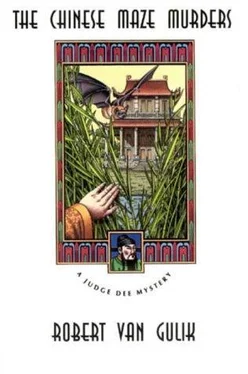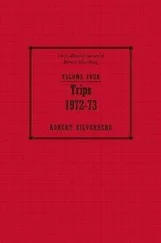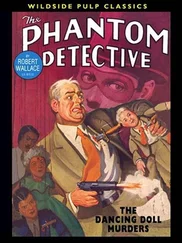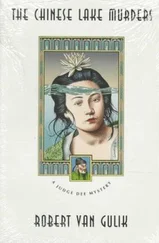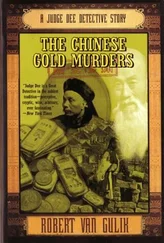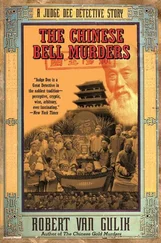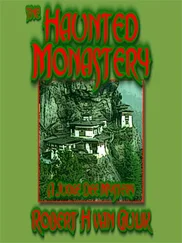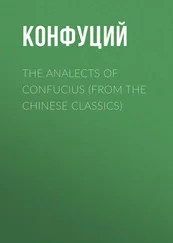Then that interfering fool, Magistrate Pan arrived. Through an unfortunate accident a letter I had written to an Uigur chieftain fell into his hands. I had to act quickly. I ordered Orolakchee, a cousin of the Khan and my confidential agent, to lure Pan to the river and kill him. Chien Mow was angry, he feared that the government would retaliate. But I instructed him how he could cover up this crime, and nothing untoward happened."
Judge Dee was going to interrupt Yoo Kee but on second thoughts he decided that it was better to let him tell his story in his own way. Yoo Kee went on in the same toneless voice:
"I would have come out into the open then were it not that the Khan received information of big Chinese victories over the barbarians in the north. He started to waver and finally withdrew his support. Then I engaged in complicated negotiations with minor chieftains, and finally succeeded in uniting three powerful tribes. They would attack the city if I guaranteed that the Watergate would be open and that the main points inside the town would be occupied by my men.
When the date had been fixed, Your Honour arrived with a regiment of the regular army for inspecting the border, Chien Mow was arrested and his men dispersed. I feared that my plans had leaked out and that in the near future a strong garrison would be sent to Lan-fang. I decided to take immediate action.
Tonight three Uigur tribes will gather in the plain. When at midnight they see the signal fire on the watchtower, they will ford the river and enter the city by the Watergate.
That is all!"
The crowd started to talk excitedly. They realized that they had narrowly escaped being overrun by cruel barbarian horsemen.
"Silence!", shouted Judge Dee.
Then he ordered Yoo Kee:
"State how many men these three tribes can put under arms!
Yoo Kee thought for a while, then he replied:
"About two thousand trained mounted archers, and a few hundred footmen."
"What part were the three Chinese shopkeepers to play in this scheme?" asked the judge.
"I never met them", Yoo Kee answered, "it was my fixed policy to remain in the background as much as possible. I ordered Orolakchee to enlist the help of about one dozen Chinese to guide the Uigur warriors to the tribunal and the gates. He located those men and guaranteed their support."
Judge Dee gave a sign to the senior scribe. He read out his record of Yoo Kee's statement, and Yoo Kee affixed his thumbmark to it.
Then the judge spoke in a solemn voice:
"Yoo Kee, I pronounce you guilty of the crime of high treason. It is possible that the higher authorities will mitigate to some degree the severity of the extreme penalty in deference to the meritorious services of your late father, and because you confessed without pressure. But it is my duty to warn you that the Code prescribes for high treason the punishment of execution by the process called 'lingering death', that is, being cut to pieces alive.
Lead the criminal away!"
Then Judge Dee addressed the court:
"I have arrested all the leaders of this nefarious scheme. The barbarians will not dare to attack tonight when they do not see the signal fire. I have issued orders, however, to make the necessary preparations for any eventuality. In the course of today you will receive instructions from your wardens what to do. The barbarians have never been able to take a walled city so there is nothing to fear!"
The spectators broke out in cheers.
Judge Dee hit his gavel on the bench. Then he announced:
"I shall now hear the case Ding versus Woo."
He filled out a slip with his vermilion brush. Soon Woo Feng was led before the dais by two constables.
As soon as Woo was kneeling the judge took from his sleeve a cardboard box and pushed it over the edge of the bench. It fell down with a thud in front of Woo.
He looked at it curiously. It was the box discovered in the sleeve of the murdered General. The corner the mouse had gnawed off had been neatly repaired.
The judge asked: "Are you familiar with that box?"
Woo looked up.
"This", he replied, "is the kind of box they sell sweet plums in. I have seen hundreds of them on sale on the market of the Drum Tower. Occasionally I have bought one myself. Thus, although I am indeed familiar with such boxes in general, I have never seen this particular one. The congratulatory inscription on top evidently means that it was offered to someone as a present."
"You are quite right", Judge Dee said, "it is an anniversary present. Do you mind tasting the plums inside?"
Woo gave the judge a bewildered look. Then he shrugged his shoulders and replied:
"Not in the least, Your Honour!"
He opened the box. Nine plums were neatly arranged on a layer of white tissue paper. Woo poked them with his forefinger. When he had found a soft one he put it in his mouth. He ate it and spat the stone on the floor.
"Does Your Honour wish me to eat more?", Woo asked politely.
"This is quite sufficient!", Judge Dee said coldly. "You may stand back!"
Woo rose and looked around at the constables. They made no move to grab him and lead him back to the jail. So he retreated a few paces and remained standing there. He looked curiously at the judge.
"Let Candidate Ding come forward!", Judge Dee ordered.
As Ding knelt in front of the bench Judge Dee spoke:
"Candidate Ding, I have now discovered who killed your father. This case proved to be a singularly complicated one, I don't pretend to have disentangled all its ramifications. Your father's life was threatened from more than one side, and more than one attempt was made to kill him. This court, however, is concerned only with the one attempt that succeeded. The accused Woo has nothing to do with that. Hence the case against Woo Feng is herewith dismissed!"
A murmur of astonishment rose from the crowd. Candidate Ding remained silent, he did not repeat his accusation of Woo.
Woo cried out:
"Your Honour, has White Orchid been found?"
When the judge shook his head Woo turned round without another word and unceremoniously elbowed his way through the spectators to the door of the court hall.
Judge Dee took a red-lacquered writing brush from the bench.
"Rise, Candidate Ding", he ordered, "and tell me what you know about this brush!"
As he spoke the judge held out the writing brush to Ding, the open end of the shaft pointing straight at the young man's face.
Candidate Ding looked dumbfounded. He took the brush from Judge Dee's hands and turned it round in his fingers. When he had read the engraved inscription he nodded his head.
"Now I see the inscription I remember, Your Honour! Some years ago when my father was showing me some rare old jade pieces he also took out this writing brush. He told me that it was an advance gift for his sixtieth birthday from a very exalted personage. My father did not reveal his name but he said that that person had told him that since he feared his end was near he wished to present that brush in advance; my father was not to use it until he had actually celebrated his sixtieth birthday.
My father valued this writing brush highly. After he had shown it to me he put it back into the locked box where he kept his jade collection."
"That writing brush", Judge Dee said gravely, "is the instrument that killed your father!"
Candidate Ding looked bewildered at the brush in his hands. He scrutinized it carefully and peered inside the hollow shaft. Then he shook his head doubtfully.
Judge Dee had followed intently his every move. Then he said curtly:
"Give that brush back to me. I shall demonstrate how the deed was done!"
When Candidate Ding had handed back the brush, Judge Dee kept it in his left hand. With his right he took a small wooden cylinder from his sleeve and held it up so that every one could see it.
Читать дальше
